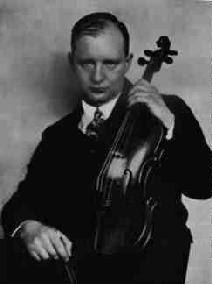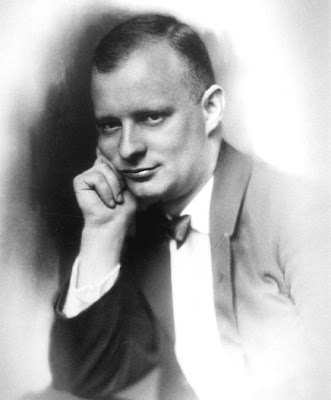
Paul Hindemith (November 16, 1895 – December 28, 1963)
The Demon (1922)

[Hindemith at 28 (1923)]
Das Marienleben (1923)
Hin und Zuruck (1927)
Nueus vom Tage (1929)
Mathis der Maler (1934)
Symphonic Metamorphoses on Themes of Carl Maria von Weber (1943)
II. Turandot Scherzo
IV. March
Paul Hindemith (16 November 1895, Hanau, Germany 28 December 1963) was taught the violin as a child. He entered the Hochsche Konservatorium in Frankfurt am Main where he studied conducting, composition and violin under Arnold Mendelssohn and Bernhard Sekles, supporting himself by playing in dance bands and musical-comedy outfits. He acted as concertmaster of the Frankfurter Museumsorchester from 1915 to 1923 and played in the Rebner string quartet from 1914 in which he played second violin, and later the viola. In 1921 he founded the Amar Quartet, playing viola, and extensively toured Europe.
In 1922, some of his pieces were heard in the International Society for Contemporary Music festival at Salzburg, which first brought him to the attention of an international audience. The following year, he began to work as an organizer of the Donaueschingen Festival, where he programmed works by several avant garde composers, including Anton Webern and Arnold Schoenberg. From 1927 he taught composition at the Berliner Hochschule für Musik in Berlin. In the 1930s he made a visit to Cairo and several visits to Ankara where (at the invitation of Atatürk) he led the task of reorganizing Turkish music education and the early efforts for the establishment of Turkish State Opera and Ballet. Towards the end of the 1930's, he made several tours in America as a viola and viola d'amore soloist.
Hindemith's relationship to the Nazis is a complicated one: some condemned his music as "degenerate" (largely on the basis of his early, sexually charged operas such as Sancta Susanna), and on December 6 1934, during a speech at the Berlin Sports Palace, Germany’s Minister of Propaganda, Joseph Goebbels publicly denounced Hindemith as an “atonal noisemaker.” Others, though, thought that he might provide Germany with an example of a modern German composer, who by this time was writing music based in tonality, and with frequent references to folk music; the conductor Wilhelm Furtwängler's defence of Hindemith, published in 1934, takes precisely this line. The controversy around his work continued throughout the thirties, with the composer falling in and out of favor with the Nazi hierarchy; he finally emigrated to Switzerland in 1938 (partly because his wife was Jewish), and in the meantime had sworn an oath to Hitler, had accepted a commission to write music for a Luftwaffe event (although it never materialized), conducted for official Nazi concerts, and accepted a position on the Reich Music Chamber. This part of Hindemith's life has until recently been downplayed by historians of the composer (such as Skelton or Kemp), who have mostly tried to assert his anti-Nazi beliefs.
In 1935, Hindemith was commissioned by the Turkish government to reorganize that country's musical education, and, more specifically, was given the task of preparing material for the “Universal and Turkish Polyphonic Music Education Programme” for all music-related institutions in Turkey, a feat which he accomplished to universal acclaim. This development seems to have been supported by the Nazi regime: it may have got him conveniently out of the way, yet at the same time he propagated a German view of musical history and education. (Hindemith himself said he believed he was being an ambassador for German culture.) Hindemith did not stay in Turkey as long as many other émigrés. Nevertheless, he greatly influenced the developments of Turkish musical life; the Ankara State Conservatory owes much to his efforts. In fact, Hindemith was regarded to be a “real master” by young Turkish musicians and he was appreciated and greatly respected.
In 1940 Hindemith emigrated to the United States. At the same time that he was codifying his musical language, his teaching and compositions began to be affected by his theories, according to critics like Ernest Ansermet (1961, note to p. 42 added on an errata slip). Once in the States he taught primarily at Yale University where he had such notable pupils as Lukas Foss, Norman Dello Joio, Mel Powell, Harold Shapero, Hans Otte, Ruth Schonthal, and Oscar-winning film director George Roy Hill. During this time he also gave the Charles Eliot Norton Lectures at Harvard, from which the book A Composer's World was extracted (Hindemith 1952). He became an American citizen in 1946, but returned to Europe in 1953, living in Zürich and teaching at the university there. Towards the end of his life he began to conduct more, and made numerous recordings, mostly of his own music. He was awarded the Balzan Prize in 1962.
Hindemith died in Frankfurt am Main from acute pancreatitis.
